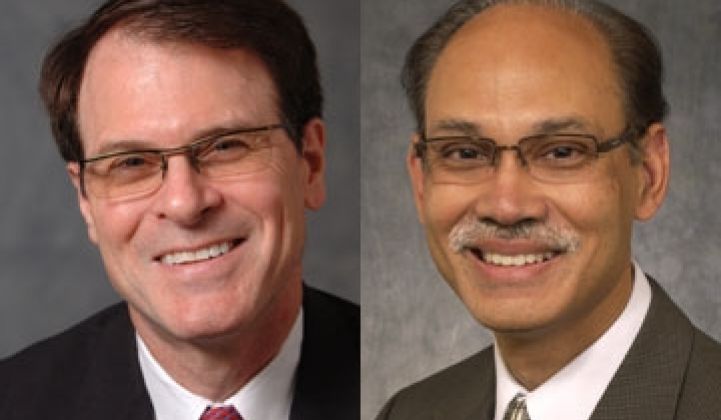Jesse Berst's Global Smart Energy and Michael Butler's Cascadia Capital have assembled this multi-part series where business leaders share their opinions on the future of the smart grid. This first installment features the The Brattle Group's Peter Fox-Penner and Ahmad Faruqui.
The Brattle Group provides consulting and expert testimony in economics, finance, and regulation to corporations, law firms and governments around the world.
Q: What is the most important next step in the development of the smart grid?
A: The most important first step is a comprehensive assessment of the benefits and costs of various elements of the smart grid, including elements involving all stages of the industry, from generation to the end user. The assessment should identify the net benefits, associated uncertainties, key drivers and unresolved policy issues. This assessment should also incorporate information from many projects, pilots and studies that are ongoing.
Those features that have high net benefits and low uncertainty should proceed toward full-scale implementation, beginning possibly with large-scale demonstrations. Those features that have high net benefits and high uncertainty should be tested through pilot programs and further research.
It is likely that several regulatory barriers will be identified during the assessment. It will be important to understand the barriers and create a ‘collaborative’ process for addressing them. Foremost on the list will be the disincentive utilities have for implementing programs that encourage consumers to use less energy, lower energy costs and improve the environment while at the same lowering utility earnings. There are several ways of addressing these barriers and they need to be revisited. Another barrier that is likely to surface is the restrictions placed by regulations on the role utilities can play beyond the meter. There are several ways of addressing these barriers and they, too, need to be assessed.
Q: What kind of “shovel-ready” jobs can the smart grid produce?
A: There are many programs on the customer side of the meter that are ready for immediate deployment. These include the deployment of smart meters. Of the 142 million meters, only 5 percent are smart. Smart meters can make customers aware of the cost of power and, if people are enabled with smart meters and in-home displays, they can help reduce peak demands and energy consumption. We have estimated that this benefit would be worth $80 billion in reduced power costs over the next four decades.
Q: What role should the federal government play in this transformation? What role should the states play?
A: The federal government can provide leadership by funding national and regional assessments of net-benefits, funding large-scale demonstrations and conducting well-designed experiments with new rate designs and new technologies. The federal government must also play a key role in providing credible, balanced educational materials and programs on smart grid technology, especially to state regulators and other stakeholders involved in state-level deployment and funding decisions.
As the nation’s central energy R&D agency, the Department of Energy should lead and coordinate federal, state and international public and private R&D into new smart grid technologies, making sure that the role of public R&D is appropriate. Finally, the federal government should determine the appropriate type and level of activities that will foster technical standards to facilitate smart grid expansion; then it should work to facilitate such standards.
States need to be closely involved in this process as well. They regulate the retail sale of electricity and have an important influence on smart rate design and revenue decoupling mechanisms. They also establish the boundary conditions on what utilities are allowed to do on the customer-side of the meter. It may make sense to hold workshops to identify the various players in the smart grid space and to seek to identify the roles each can play in that space. Without such a reconsideration of roles, the players may engage in sub-optimal strategies.
(Pictured above The Brattle Group's Peter Fox-Penner, Principal and Chairman Emeritus, left, and Ahmad Faruqui, Principal, right.)
This piece is not connected with Greentech Media News. The views expressed here are those of the authors and are not endorsed by Greentech Media.



